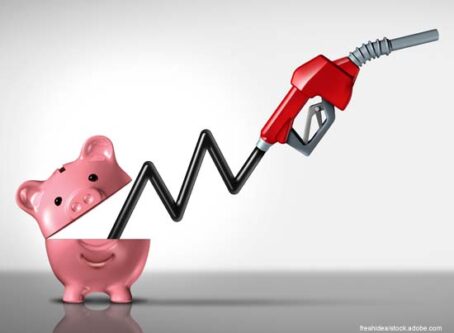Fuel tax relief, tax rebate efforts continue nationwide
Relief efforts at statehouses around the country provide breaks from fuel taxes for at least certain drivers and relief in other forms.
Colorado
In Colorado, a bill nearing passage at the statehouse would delay an upcoming fuel tax increase.
One year ago, Gov. Jared Polis signed into law a massive transportation funding deal that includes a new 2-cents-per-gallon fee on gas and diesel. The fuel tax increase is scheduled to take effect on July 1.
The governor said at a recent news conference that “now is not the time” to increase fuel taxes.
At the governor’s urging, HB1351 would delay implementation of the new tax for six months to Jan. 1.
Delaying implementation of the new fuel tax is estimated to result in a $29.9 million hit to state revenue.
Florida
In Florida, state lawmakers have reached agreement on a gas tax holiday initially pursued by Gov. Ron DeSantis.
The legislature approved a state budget that includes a one-month gas tax holiday. The tax holiday from collecting the 27-cent tax rate would be for the month of October.
A portion of the state’s federal stimulus dollars will be used to cover the estimated $200 million in lost gas tax revenue.
Illinois
Illinois Gov. J.B. Pritzker has signed the state’s $46.5 billion budget for the next year. Included in the budget are tax rebates.
Checks will range from $50 to $400. The state will send out the money later this year.
The governor also signed a number of tax policy changes that include a freeze to the state’s 39.2-cent gas tax rate and 46.7-cent diesel rate.
A 2-cent cost-of-living adjustment set for July 1 will be delayed for six months.
A potential wrench could be thrown into the planned tax freeze. At issue is a requirement for fuel stations to post signs notifying customers about the tax freeze.
The Illinois Fuel and Retail Association plans to file a lawsuit against the sign requirement. The group cites opposition to “political speech” for the legal challenge.
New York
A budget deal between New York state lawmakers and Gov. Kathy Hochul includes a fuel price break. The $220 billion state budget includes a provision to partially suspend the state’s fuel taxes for seven months.
The state charges about 33 cents per gallon for gas and diesel. There are multiple components that make up the state’s fuel tax collection.
There is an 8-cent excise tax and a 17.3-cent petroleum business tax. Additionally, there is an 8-cent state sales tax.
The deal reached would trim tax collection by 16 cents per gallon. Specifically, excise tax and state sales tax collection would be suspended from June 1 through the end of the year.
New York’s excise tax and the sales tax raise about $485 million each per year.
The tax break will cost the state $585 million in lost fuel revenue.
Virginia
A Virginia Senate panel voted to nix a proposed suspension of state fuel tax collection for three months. House lawmakers previously approved the bill.
Virginia collects a 26.2-cent-per-gallon tax on gas and a 27-cent rate for diesel.
Gov. Glenn Youngkin is calling for a tax holiday to run from May through July and to phase it back in slowly in August and September.
The Republican governor said the state could absorb the lost revenue by tapping into excess transportation funds. The amount needed is estimated to be about $437 million.
His plan would also cap the annual adjustment to the fuel taxes at no more than 2% per year “to further protect Virginians from the hidden tax increase of inflation.”
Leading Democrats are opposed to a fuel tax break. Instead, they want to send $50 rebate checks to vehicle owners.
They say rebates would provide money directly to Virginians without affecting transportation funds.
Three states acted in March to provide tax relief at the pump.
Connecticut
In Connecticut, a three-month holiday from paying the state’s 25-cent excise tax on gas took effect on April 1. The tax holiday does not affect the 41.1-cent excise tax on diesel.
The gas tax holiday was set to run through the end of the fiscal year – June 30. As part of a budget deal agreed upon by state lawmakers and Gov. Ned Lamont, the tax break will be extended to Dec. 1.
Georgia
A fuel tax holiday that includes diesel is ongoing in Georgia.
The state normally collects a 29.1-cent gas tax and a 32.6-cent diesel tax.
Gov. Brian Kemp last month signed into law a suspension of state fuel taxes through May 31.
The governor said the state is in a good position to provide a tax break because of a $3.7 billion budget surplus through fiscal year 2021.
Maryland
Maryland was the first state to take action on a fuel tax holiday.
A 30-day suspension of the state’s 36.1-cent gas tax and 36.85-cent diesel tax concluded April 16.
Suspending collection of fuel taxes was estimated to cost the state $100 million.
Advocates said the lost revenue would be covered by dipping into the state’s $7.5 billion budget surplus.
IFTA effect
Pursuit at statehouses for fuel tax holidays that include diesel has had truckers asking what a tax break would mean for paying their tax through the International Fuel Tax Agreement.
IFTA Executive Director Carmen Martorana previously told Land Line Media that drivers wouldn’t have to pay state fuel tax if they are buying and burning the fuel in a state that is not collecting the tax.
Martorana said that drivers who buy fuel in a state with a fuel tax exemption and drive in a state without an exemption, drivers would have to pay that tax out of pocket.
She added that if a driver pays taxes on fuel in one state, but then drives in a state that has a tax holiday, they can get reimbursed.
Tax rebates
In addition to fuel tax holidays, other pursuits in statehouses across the country are geared toward providing tax relief in the form of rebates.
New Mexico Gov. Michelle Lujan Grisham recently signed into law legislation to provide a gas tax rebate.
Approved during a special session, the legislation gives single tax filers a $500 rebate check. Joint filers will receive $1,000.
The money will be made available in two separate payments, with the first payment by June 30. The second check will follow in August.
California
Bipartisan pursuit at the California statehouse for fuel tax relief has died.
As a result, a scheduled inflationary adjustment on gas and diesel excise will occur on July 1. The rate increase is expected to be nearly 3 cents per gallon.
Instead, relief efforts that include rebates remain on the table.
“We believe a rebate is a better approach that suspending the gas tax – which would severely impact funding for important transportation projects and offers no guarantee that oil companies would pass on the savings to consumers,” a letter from Democratic leaders reads.
The state’s budget surplus would be tapped to send rebate checks to California taxpayers making less than $125,000 or families making less than $250,000. The proposed amount for each taxpayer is $200.
Democratic Gov. Gavin Newsom has proposed giving $400 per vehicle to drivers, with a maximum of $800 per family.
Relief at the pump, however, is not dead.
A group of bipartisan lawmakers dubbed the Problem Solvers Caucus announced last week their pursuit of a year-long suspension of the state’s 51.1-cent gas excise tax.
Retailers would be required to pass 100% of the tax relief on to consumers.
We love to see collaboration! The process of seeking common ground defines a @CAProblemSolver https://t.co/TK83w5yvM7
— California Problem Solvers Caucus (@CAProblemSolver) April 28, 2022
“Democrats, Republicans and independents are all feeling the pain at the pump,” Assembly member Adam Gray, D-Merced, said in a news release. “This is not a partisan problem. The Problem Solvers support taking immediate action to lower gas prices while looking for long-term affordability solutions.”
Elsewhere, rebate plans not directly tied to fuel
In addition to the fuel tax holiday, Georgia lawmakers approved tax rebates.
Single filers are eligible for $250 rebates. Joint filers are eligible for $500 rebates.
Idaho tax filers are eligible for $75 rebates or 12% of their 2020 state taxes, whichever is greater.
Tax filers in Indiana soon will receive a $125 one-time tax refund.
Many Maine taxpayers are eligible to receive $850 relief payments starting June 1.
Pursuit underway around the country would also provide tax relief.
The Hawaii Legislature is nearing passage of a tax rebate bill for all households. Tax rebates for each filer would range from $100 to $300, depending on income level.
Kansas Gov. Laura Kelly is pushing for a $250 tax rebate for single filers to help with rising prices. Joint filers would get $500.
The one-time rebate would be used for state residents who filed a 2020 tax return in 2021.
A Missouri House-approved bill would provide a one-time tax credit. Individual filers would get $500 and joint filers would receive $1,000.
Multiple pursuits in New Jersey would provide tax rebates.
The legislation would offer a $250 rebate to single tax filers who make up to $125,000 per year. Joint filers making up to $250,000 annually would receive a $500 rebate. LL
Land Line Now Senior Correspondent Ashley Blackford contributed to this report.
More state trends
Keith Goble, state legislative editor for Land Line Media, keeps track of many trends among statehouses across the U.S. Here are some recent articles by him.









